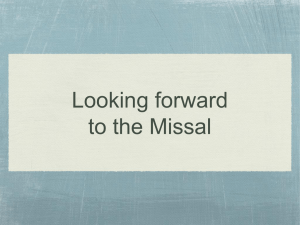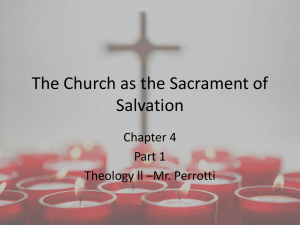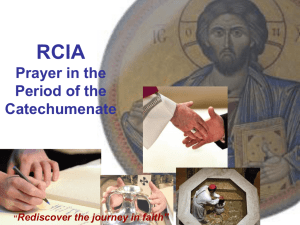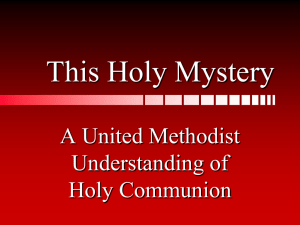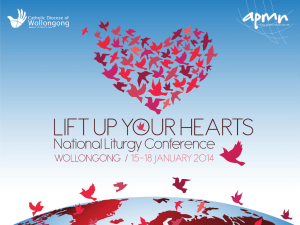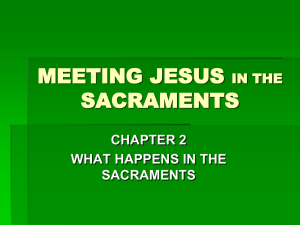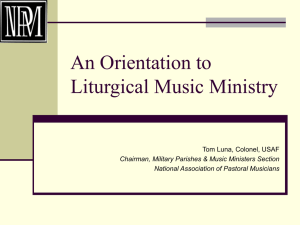The Communion Rite: ..... Powerpoint Presentation
advertisement
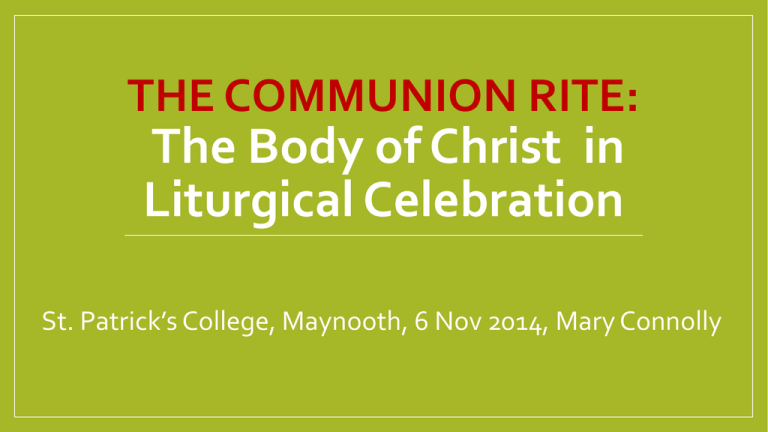
THE COMMUNION RITE: The Body of Christ in Liturgical Celebration St. Patrick’s College, Maynooth, 6 Nov 2014, Mary Connolly The Lord’s Day - Sunday Mass “sine Dominica non possumus” “without the Sunday Eucharist we cannot go on living” The witness of the Martyrs of Abitina (ca 304 CE) The Liturgy is… the summit toward which the activity of the Church is directed...the fount from which all the Church’s power flows… the source for achieving in the most effective way possible human sanctification and God’s glorification, the end to which all the Church’s other activities are directed.(SC 10) The experience of the people is… “It is a beautiful statement. Unfortunately, it is not true… Less than half of all Catholics celebrate Mass each Sunday – and even many who do attend do not see it as essential to providing direction for their lives.”Paul Bernier S.S.S., Living the Eucharist, Introduction,2005 Admittedly… As liturgists… we have not reflected, sufficiently, on what people actually experience Sunday after Sunday, the meaning(s) which they attribute to that practice, individually and collectively. Liam M. Tracey,” Liturgical Studies in a New Millennium”, ITQ 66 (2001) What are we doing ? Several meanings present at the same time in any religious ritual: •private •official •public It is often the public or individual meaning ascribed to a liturgical action that is normative for the participant Lawrence A. Hoffman, cited in Liam M. Tracey, “Liturgical Studies in a New Millennium”, ITQ 66 (2001) Liturgy: Leitourgia... érgon = work; laos = people … making the work of our redemption a present actuality... (SC 2) …this great work wherein God is perfectly glorified and the recipients made holy… (SC 7) The participation of the People of God in the work of God... CCC1069 The official public worship of the Church Celebrating our Rites To accomplish so great a work, Christ is always present in His Church, especially in its liturgical Celebrations (SC 7) Celebrating the Rites of the Church “Apart from the Eucharist, hardly any other shared forms of prayer exist for most parishioners. Without habits to provide day-in, day-out prayers, to train us in how to pray, to lead us in ways of praise, petition, thanks and contrition we have no way to prepare to pray the eucharist, no way to learn how to pray in large gatherings, no way to let the eucharist echo through the week. “We learn to pray by praying, and we learn to pray the Mass through the many ways that ritual prayer enters our lives throughout the day and the week.” Gabe Huck & G.T. Chinchar; Liturgy – Wth Style and Grace How do parishes pray..? Without ceasing… Lex Orandi, Lex Credendi Prosper of Aquitaine Liturgy : the privileged place for catechising the People of God (Catechism 1074) The Rites of the Church both express and shape the beliefs of the celebrating community The Liturgy of The Hours ‘Celebrating the Liturgy of the Hours sets us up really, to celebrate the Eucharist.’ Browne, Sheila. “Our Prayer and My Prayer: What’s the Difference? What’s the Same? Forms of Prayer that Complement Liturgical Prayer,” Liturgical Ministry (Fall,2003): 213-217. ‘The Church holds a high doctrine of the divine office, yet its practice must be said to be low… It is one sector of the liturgy of which the laity know hardly anything at all…’. J.D. Crichton cited in Robert Taft, S.J. The Liturgy of the Hours in East and West (Collegeville MN: The Liturgical Press, 1986),xii. Morning Prayer - Saturdays - Eastertide Eternal Shepherd, strengthen us for the coming day with the bread of your word; nourish us with the bread of the eucharist. R Lord, may your resurrection enrich us with your grace. Which country would be more Christian? “If in one country Mass was celebrated for thirty years without preaching and in another there was preaching for thirty years without the Mass, people would be more Christian in the country where there was preaching.” Yves Congar OP, Concilium 33 (1968) Our Daily Bread: the ordinary everyday… Monday to Saturday … Our Daily Practice Rural Community Urban community • Mass once/twice a week • Daily Mass • Adore the Blessed Sacrament • Say The Rosary (May & October) • Priest’s Day Off: A Communion Service Holy Communion and Worship of the Eucharist Outside Mass (1973) The celebration of the eucharist… is the true origin and purpose of the worship shown to the eucharist outside Mass. Purpose Of Eucharistic Reservation • The primary and original reason for reservation of the eucharist outside Mass is the administration of viaticum. • The secondary ends are the giving of communion (to unite, through sacramental communion, the faithful unable to participate in the Mass, especially the sick and the aged, with Christ and the offering of his sacrifice) and the adoration of our Lord Jesus Christ present in the sacrament. Extraordinary Ministers of Communion (1973) Directory for Sunday Celebrations in the Absence of a Priest (1988) Among the forms of celebration found in liturgical tradition when Mass is not possible, a celebration of the word of God is particularly recommended, and also its completion, when possible, by eucharistic communion...[20] Sunday Worship in the Absence of a Priest (SWAP) The absence of the Eucharist? The absence of the consecration… A Communion Service Spot The Difference! A Liturgy with Communion •The Consecration is absent •Hosts come from the Tabernacle The Mass •The Consecration/ Eucharistic Prayer •Hosts come from…? Does it matter? Redemptoris Sacramentum(2004) Particular Celebrations carried out in the Absence of a Priest It is necessary to avoid any sort of confusion between this type of gathering and the celebration of the Eucharist [DSCAP 22] …the diocesan bishops… should prudently discern whether holy communion ought to be distributed in these gatherings .[165] The Exception… Sunday celebrations of this specific kind, however, are to be considered altogether extraordinary. [RS164] The Solution..? “see the substitutional character of these celebrations, which should not be regarded as the optimal solution to new difficulties nor as a surrender to mere convenience.” [ DSCAP 21] “Proceed judiciously, but without multiplying this type of Sunday assembly, as though it were the ideal solution and the last chance.” [Paul VI, Central France,1977] The Problem… “...have come to judge that Holy Communion regularly received outside of Mass is a short-term solution that has all the makings of becoming a long-term problem.” (Bishops of Kansas, Sunday Communion Without Mass 1995) Regularly long-term The Rule: becoming the new norm… Assemblies of this kind should not take away but rather increase the desire of the faithful to take part in the celebration of the eucharist, and should make them more eager to be present at the celebration of the eucharist. DSCAP 22 If such celebrations become the norm, the need for a priest and, ultimately, the need for the Eucharist, is no longer felt… The Norm: a fourfold action… •Took •Blessed •Broke •Gave DO THIS... • Take • Bless • Break • Give Bless Give The Liturgy of the Eucharist: A Fourfold Action Bless Give Take As ________________and___________ bring forward the bread and wine, we are invited to see ourselves represented in these gifts. Now is the time to pick up your life your worries and wishes, your relationships, your reality – and join it with the bread and wine... Pick up your life and place it on the altar to be transformed into the Body of Christ. (see D. Harrington, Eucharist,2007) Break “I love you as God loves you, to bloodshed. I break myself as bread for you to share and become bread that is broken for each other” (Sebastian Moore OSB) Communion with Christ and with One Another (2012) “The Eucharist is... When you receive communion, how conscious are you of not only the sacrament of our personal intimacy with Christ, receiving what you are? but the sacrament of our baptismal bond with each other; Do you think many members of your community see the Communion is an intimate act communal dimensions of but it is never a private one.” Communion, or is it primarily a (Nathan D. Mitchell, Worship 78, ’04) private moment with Jesus? The Blood of Christ – Amen! ‘the average modern Catholic theology of the Eucharist is without a future.’ Edward J. Kilmartin, “The Catholic Tradition of Eucharistic Theology: Towards the Third Millennium”, in Theological Studies 55:3 (September 1994) 443- 449, at 443. “Do THIS…” In the Catholic tradition the object of the command has been too narrowly understood to be the objects of the bread and cup and combined with an almost exclusive focus on the raising of the host and chalice, the people have been left with “a ritual of adoration but not a liturgy for participation in the transforming, narrative remembrance of Jesus.” David Gregg cited in Bruce T.Morrill, Anamnesis as Dangerous Memory (Collegeville, MN: The Liturgical Press, 2000) 170. Communion without Mass: the ritual unity and essential action of the Liturgy of the Eucharist is now broken: •no taking, •no blessing, •no breaking of bread... •give The Communion Rite • The Lord’s Prayer “The peace of the Lord…” • Sign of Peace • Breaking of Bread – “Lamb of God” • Invitation to Communion “Behold the Lamb of God • Distribution of Communion • Post-Communion Prayer Liturgy with Communion •The Lord’s Prayer •Sign of Peace •Invitation to Communion “Behold the Lamb of God •Distribution of Communion •Concluding Prayer The Body of Christ - Corpus Verum “...by the same Spirit graciously make holy these gifts we have brought to you for consecration, that they may become the Body and Blood of your Son our Lord, Jesus Christ.” EP III The Body of Christ - Corpus Mysticum “Grant that we, who are nourished by the Body and Blood of your Son and filled with his holy Spirit, may become one body, one spirit in Christ.” EP III Christ Is Present •in the people gathered •in the Gospel that’s read •in the priest • in the consecrated wine and bread (Alive O 4; Irish R. E. Primary School Programme) in the absence of the eucharist the presence of Christ... The Dilemma of Priestless Sundays At root, the problem is the lack of priests, and “to offer a liturgical solution to non-liturgical problem” is unwise to say the least. Simply continuing the present policy is a choice…that is a more radical departure from tradition than changing the ordination discipline. James Dallen, 1994 The Pastoral Task... a particularly important and urgent mission for today’s church. Along with participation in catechesis, the preparation for baptisms and weddings is one of the main sources of the renewal of Christian communities everywhere, cities, suburbs, rural areas... In our kind of society, it is a whole “catechumenal” dimension of the church that should be developed as one of the major “strategic” axes of its mission.” Chauvet, Louis-Marie. The Sacraments: The Word of God at the Mercy of the Body. Trans Madeleine Beaumont. Collegeville, MN: The liturgical Press, 2001,199. The Parish – A Structure How to organise for mission: • In the past ‘ministry’ was something the clergy did for the people... • Then, lay people began to ‘help’ Father... • Today, all share the same baptismal vocation... “Our common baptismal vocation, our mutual need of each other’s charisms, and our co-responsibility for the church’s ministry, impel us to a life of collaboration” Role of the Laity, Cardinal R. Mahoney Parishes In Transition: the People of God participate… Assess the needs Priorities Be informed Guiding Principles Commit to a process Reviews Discernment Parish communities need to undertake a ‘double’ discernment: 1. An assessment of the liturgical/pastoral needs of the parish and its resources… 2. A prayerful discernment of those who would best lead the community’s worship in the absence of the priest… Care is required to ensure that the ministry does not become one person’s exclusive domain. On the other hand, parishes do not need a large number of people for this ministry. Public Commissioning Lay Leaders of Liturgy are publicly commissioned in their local parish for a specified length of time after • being called by the their community, • completing a training/formation programme • being accepted by the Bishop This process will enable lay leaders of liturgy to exercise their ministry confident in the knowledge that they act on behalf of the Church. The Morning’s Mystery of Love Holiness is not something I get in the morning at Mass and then which throughout the day leaks out of me, grows ever less so that I must recharge myself again the next morning or the next Sunday. Instead, our day, our day’s meeting with other people, our work, should itself become an unfolding, a development, a deepening renewal of the morning’s mystery of love.’
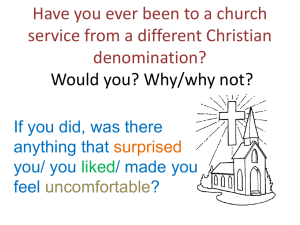
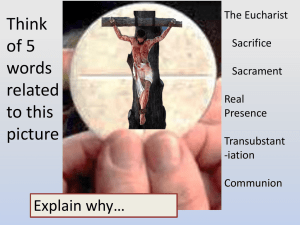
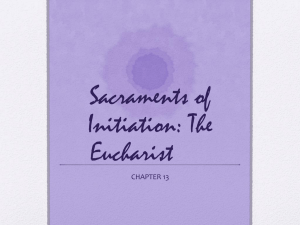
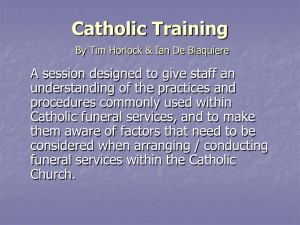
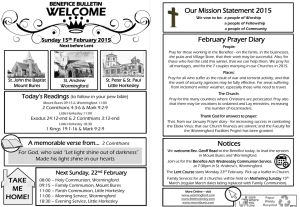
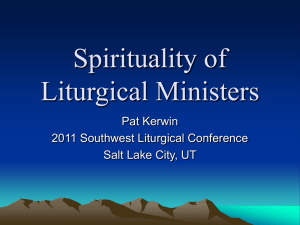
![10] ARTICLES ON THE EUCHARIST.doc](http://s3.studylib.net/store/data/008063614_1-5a52eaa67f9352a88e96e10749603082-300x300.png)
